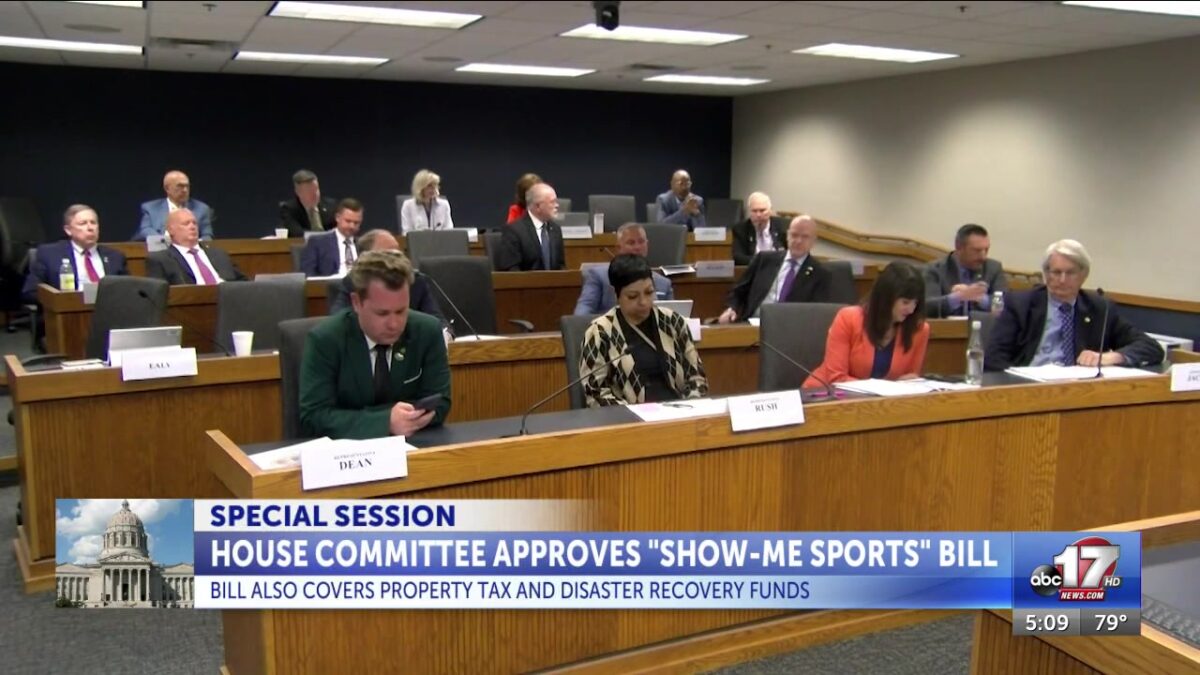Missouri House committee approves of Kansas City stadium bill

Marie Moyer
JEFFERSON CITY, Mo. (KMIZ)
In an 11-2 vote with one member abstaining, the Missouri House Committee of Economic Development approved Senate Bill 3 Tuesday afternoon.
SB3 covers a wide range of items, with the Show-Me Sports Investment Act being the hot topic of the bill.
If the act passes, Missouri’s Office of Administration and the Department of Economic Development will give tax credits to Missouri’s professional sports teams’ construction projects. The project must cost at least $500 million and involve stadiums with more than 30,000 seats. The state could cover up to 50% of the total cost and eligible teams could also access a tax credit worth up to 10% of their investment.
This deal is part of the current “Border War” between Kansas and the Show-Me state on the location of Kansas City sports’ home state.
Supporters of the act argue that its implementation will improve Missouri’s identity as a tourist destination while also bringing jobs to the state.
“The bottom line is if the teams go across the state line, we will lose a lot of the revenue that we currently generate, if we keep them here, the state of Missouri will be better off, the city of Kansas City would be better off,” Kansas City’s 2nd District Councilman and former Rep. Wes Rogers said.
Rogers added in his testimony that outside of bringing in sports-entertainment-related jobs, additional sports construction could be a draw to people relocating to Missouri.
“So one lady from Columbia, which is an Ivy League (school), says, ‘well, I don’t really like baseball, but we sure go by the stadiums a lot to eat dinner,’ and I said, ‘We got great restaurants here, and there’s going to be more once we build the stadiums,'” Rogers said.
Opponents of the bill warned that it would give too much power to private corporations and cause public services like public schools and healthcare to lose out on state funding.
A major opponent of the bill was Patrick Tuohey of Show-Me Institute. His passionate testimony argued that Missouri shouldn’t be making a deal to keep professional sports teams in the state at the expense of funds, comparing the border war to a “race to the bottom.”
“When we talk about pride, we talk about, ‘I love our teams.’ When we talk about how much it means to Missouri, understand this: The teams do not love us back, this is a bottom line deal for them and they are telling us, ‘If you want us to stay, if you want our love, it’s going to cost you,'” Tuohey said. “There’s a word for that, and it’s nothing that the Missouri legislature should participate in.”
The bill does mention that if a team decides to move out-of-state after SB3 is approved, “the owners of the franchise shall repay the state the amount of funds expended by the state under the agreement and the total debt service remaining for any outstanding bond indebtedness, as described in the act.”
A similarly controversial part of the bill is the addition of a property tax freeze. If approved, voters in 97 of Missouri’s 144 counties would have the option to vote in 2026 for the freeze. This would be similar to the state’s property tax freeze for seniors. Opponents of the credit argued that lower property taxes would harm public services that receive funds from property taxes and that it was unfair for only certain counties to have the opportunity to vote.
“For many, many decades, local property taxes have been primarily what funds schools, we’re one of the most reliant states on local school revenues, we spend about 60% local money when we’re investing in our schools each year,” Otto Fajen Legislative Director of the Missouri National Education Association said. “It needs to be seen as something that is functional and fair.”
SB 3’s Sponsor Sen. Kurtis Gregory (R-Marshall) argued the cut would help increase residential growth.
“There’s some instances where people are literally getting taxed out of their home because they have just enough in their paycheck to make ends meet,” Gregory said. “Every county, I think when you look at how property tax functions, is different, I think in your faster growing counties it is easier and maybe more prudent for there to be the freeze because there is enough new things being built in coming on to the tax rolls.”
If passed, SB3 would reauthorize the amateur sports credit. Under the credit, businesses that support amateur or youth sports events and facilities would receive a tax break. The bill would also offer a $5,000 tax credit in 2025 to people whose homes were damaged in storms. These parts of the bill were left mainly unopposed during the hearing.
SB3 also has a severability clause that would allow parts of the bill to be passed or overturned, instead of the entire document being overturned if one aspect is struck down.
The House’s Fiscal Review Committee will review the bill at 8:15 a.m. Wednesday in House Hearing Room 4, and the bill will then move to the House floor for discussion.